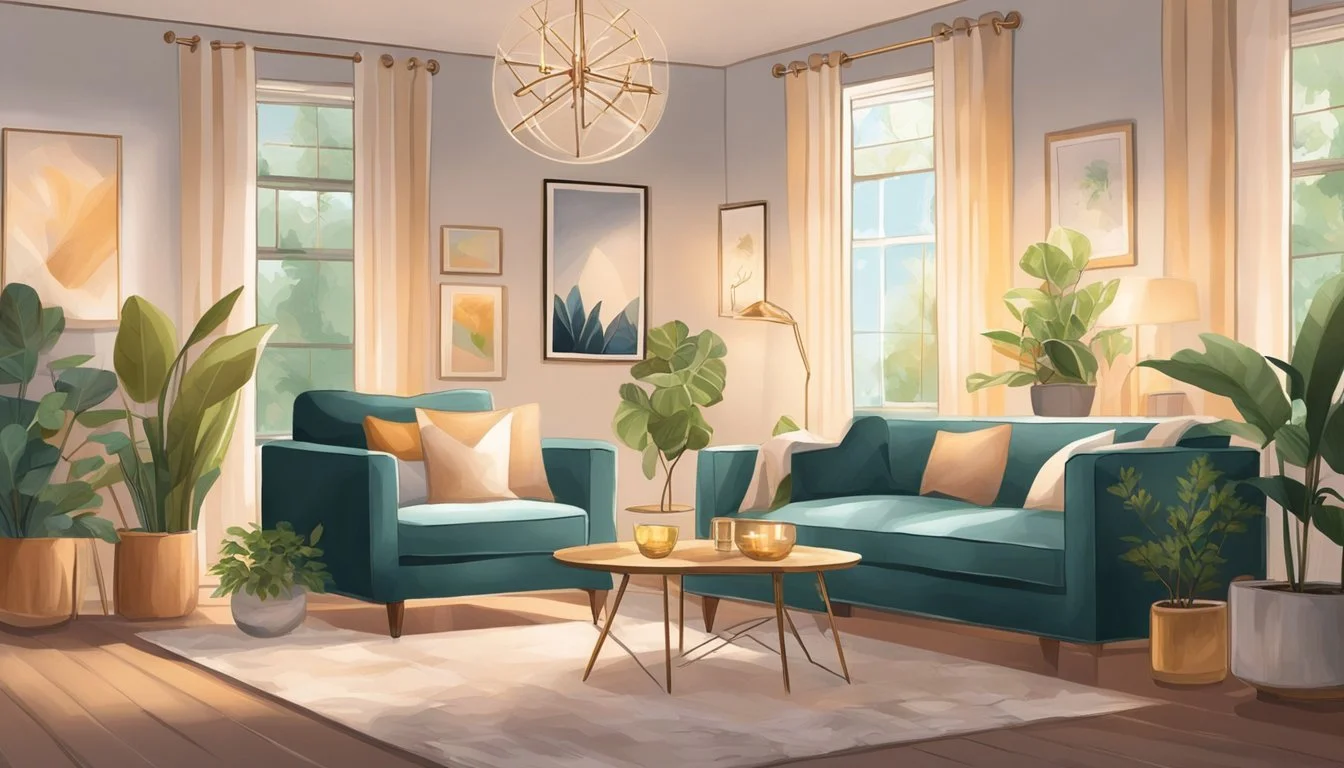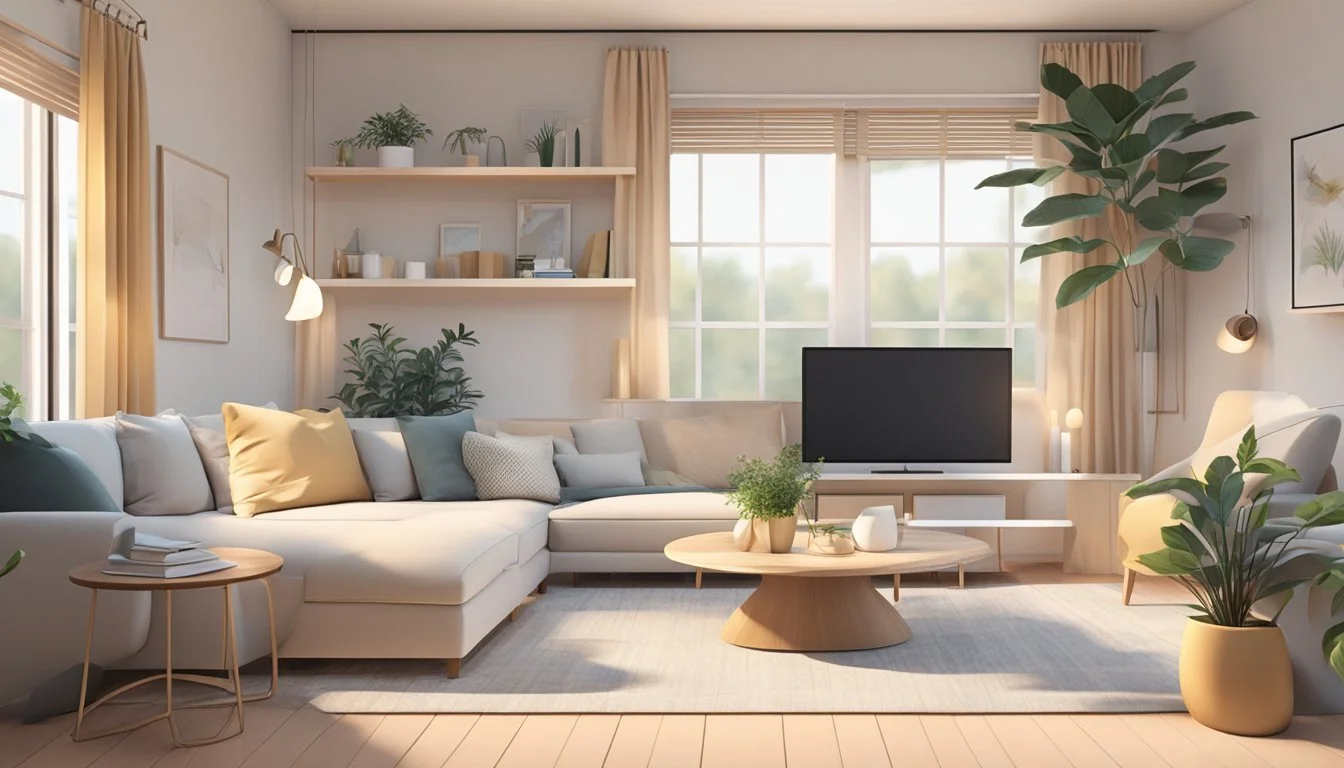9 Ways Empaths Can Create a Harmonious Home Environment
Simple Strategies for Sensitive Souls
Empaths possess a unique sensitivity to their surroundings, making the creation of a harmonious home environment crucial for their wellbeing. A thoughtfully designed living space can provide much-needed sanctuary from the constant influx of external energies and emotions that empaths experience daily.
Implementing specific strategies to cultivate a positive atmosphere at home can significantly enhance an empath's ability to recharge and thrive. By focusing on elements that promote calmness, minimize clutter, and incorporate natural elements, empaths can transform their living spaces into nurturing havens that support their emotional balance and overall health.
1) Practice Mindful Meditation
Mindful meditation can be a powerful tool for empaths to create a harmonious home environment. This practice involves focusing on the present moment and observing thoughts and feelings without judgment.
Empaths can start by setting aside a quiet space in their home for daily meditation. Even just 5-10 minutes each day can make a significant difference in managing emotional energy.
During meditation, empaths can practice techniques like deep breathing, body scanning, or visualizing a protective bubble of light. These methods help create a sense of inner calm and strengthen emotional boundaries.
Regular mindful meditation can enhance an empath's ability to differentiate between their own emotions and those of others. This skill is crucial for maintaining a balanced and peaceful home atmosphere.
As empaths become more attuned to their inner state through meditation, they may find it easier to navigate challenging situations and interactions within their living space. The practice fosters emotional resilience and self-awareness.
2) Utilize Soft Lighting
Soft lighting plays a crucial role in creating a harmonious environment for empaths. Harsh, bright lights can overwhelm their sensitive nature and disrupt their energy balance.
Opt for warm, dimmable light sources throughout the home. Table lamps, floor lamps, and wall sconces with adjustable brightness allow empaths to control the intensity of light as needed.
Consider installing dimmer switches on overhead lights to easily adjust the ambiance. Soft white or amber-colored bulbs create a soothing atmosphere compared to cool-toned or fluorescent lighting.
Natural light is also beneficial for empaths. Use sheer curtains or adjustable blinds to allow sunlight while maintaining privacy and controlling glare.
Candlelight can provide a calming effect and create a peaceful ambiance. Place candles strategically in living areas and bedrooms for a gentle, flickering glow.
Salt lamps are another excellent option for empaths. They emit a soft, warm light and are believed to help purify the air and reduce electromagnetic radiation.
By carefully selecting and positioning light sources, empaths can create a serene and comforting home environment that supports their well-being.
3) Incorporate Natural Elements
Empaths can benefit greatly from bringing nature indoors. Adding plants to living spaces creates a calming atmosphere and improves air quality. Flowering plants like lavender or jasmine provide pleasant scents that can soothe the senses.
Natural materials such as wood, stone, and bamboo can be incorporated into furniture and decor. These elements connect empaths to the earth and promote a sense of grounding. Wooden shelves or stone coasters are simple ways to introduce these materials.
Water features like small fountains or tabletop waterfalls add a soothing auditory element. The gentle sound of flowing water can help mask outside noise and create a tranquil environment.
Natural light is crucial for empaths. Maximizing window exposure and using sheer curtains allows sunlight to flood the space. This helps regulate mood and energy levels throughout the day.
Crystals and gemstones can be placed strategically around the home. Many empaths find these natural elements help absorb and neutralize negative energies. Popular choices include amethyst, clear quartz, and black tourmaline.
4) Create a Personal Sanctuary
Empaths can benefit greatly from having a designated space within their home that serves as a personal sanctuary. This area should be a quiet, comfortable spot where they can retreat to recharge and find solace.
Choose a location that feels peaceful and separate from the busier parts of the home. It could be a spare room, a cozy nook, or even a secluded corner of the bedroom.
Fill this space with items that bring comfort and joy. Soft textures, calming colors, and meaningful objects can help create a soothing atmosphere. Consider adding plants or natural elements to enhance the sense of tranquility.
Ensure the sanctuary is free from electronic devices and distractions. This allows empaths to disconnect from external stimuli and focus on their own needs and emotions.
Incorporate elements that engage the senses in a positive way. Soft lighting, gentle scents, or calming sounds can help create a restorative environment.
Establish boundaries around this space. Let family members or housemates know that this area is reserved for quiet reflection and should be respected as such.
5) Set Healthy Boundaries
Empaths often struggle with setting and maintaining boundaries. Creating a harmonious home environment requires establishing clear limits to protect one's emotional well-being.
Empaths can start by identifying their personal needs and comfort levels. This self-awareness allows them to recognize when their boundaries are being crossed.
Communicating boundaries clearly and assertively is crucial. Empaths should express their limits to family members and roommates without guilt or hesitation.
Learning to say "no" is an essential skill for empaths. Declining requests that would drain their energy or violate their boundaries helps maintain emotional balance.
Empaths can create physical spaces within the home that are designated as personal retreats. These areas provide a sanctuary for recharging and processing emotions.
Setting time boundaries is equally important. Empaths should allocate specific periods for solitude and self-care, communicating these needs to others in the household.
Consistent reinforcement of boundaries is necessary. Empaths may need to remind others of their limits and stand firm when faced with resistance.
By implementing healthy boundaries, empaths create a more balanced and peaceful home environment for themselves and those around them.
6) Play Calming Music
Music can profoundly influence the atmosphere of a home. For empaths, selecting the right tunes is crucial to maintaining a harmonious environment.
Soft, instrumental pieces often work well. Classical compositions, ambient sounds, and nature recordings can create a soothing backdrop without overwhelming sensitive individuals.
Some empaths find comfort in specific artists or genres. Enya, for example, is popular among many sensitive listeners. Her ethereal melodies and gentle vocals can help create a tranquil atmosphere.
Consider creating playlists tailored to different moods or times of day. A morning playlist might include uplifting yet gentle tracks, while evening music could focus on relaxing, sleep-inducing sounds.
Volume is key for empaths. Keep music at a low level to avoid sensory overload. Using high-quality speakers or headphones can enhance the listening experience without increasing volume.
Experiment with different styles to find what resonates best. Some empaths may prefer silence at times, so be flexible and adjust as needed.
7) Declutter Regularly
Empaths often find clutter overwhelming and draining. Regular decluttering helps maintain a calm, harmonious home environment. Set aside time each week or month to go through belongings and remove unnecessary items.
Start with one area at a time to avoid feeling overwhelmed. Focus on keeping only items that serve a purpose or bring joy. Consider donating or recycling things that are no longer needed.
Implement a "one in, one out" rule to prevent accumulation. When bringing a new item home, remove something similar to maintain balance. This practice helps prevent clutter from building up again.
Digitize documents and photos when possible to reduce physical clutter. Store important papers in an organized filing system for easy access. Keep surfaces clear and create designated spaces for frequently used items.
Encourage family members to participate in decluttering efforts. Make it a team activity to create a shared sense of responsibility for maintaining a tidy home. Regular decluttering sessions help empaths feel more in control of their space and energy.
8) Display Inspirational Quotes
Empaths can enhance their home environment by displaying inspirational quotes that resonate with their sensitive nature. These quotes serve as daily reminders of the power of empathy and compassion.
Selecting quotes from renowned empaths or world changers can infuse the space with positive energy. Phrases that highlight the importance of understanding others and connecting on a deeper level are particularly impactful for empaths.
Placement of these quotes matters. Empaths might consider putting them in areas they frequent, such as the bedroom, living room, or home office. This ensures regular exposure to uplifting messages throughout the day.
Various mediums can be used to display quotes. Framed prints, wall decals, or even handwritten notes on a bulletin board can all be effective. The key is choosing a method that aligns with the empath's personal style and home decor.
Rotating quotes periodically keeps the messages fresh and prevents them from becoming background noise. This practice allows empaths to continually draw inspiration from different perspectives and insights.
9) Use Essential Oils
Essential oils can significantly enhance the atmosphere of an empath's home. These concentrated plant extracts offer natural fragrances and potential therapeutic benefits.
Lavender oil is known for its calming properties, making it ideal for bedrooms or relaxation areas. Peppermint oil can invigorate and energize, suitable for home offices or workout spaces.
Frankincense oil is believed to promote grounding and emotional balance. Empaths may find it helpful in meditation corners or living rooms. Eucalyptus oil can create a refreshing and cleansing ambiance in bathrooms or entryways.
Diffusers are an effective way to disperse essential oils throughout the home. Alternatively, adding a few drops to a bath or applying diluted oils to pulse points can provide personal aromatherapy experiences.
When selecting essential oils, it's important to choose high-quality, pure products. Some empaths may prefer to create custom blends that resonate with their specific needs and preferences.
It's advisable to use essential oils in moderation, as strong scents can sometimes overwhelm sensitive individuals. Experimenting with different oils and concentrations can help empaths find the right balance for their living spaces.
Understanding the Empathic Experience
Empaths possess a unique ability to sense and absorb the emotions of others. This heightened sensitivity shapes their interactions and experiences in profound ways.
Recognizing Empathic Abilities
Empaths often feel emotions deeply, even those of strangers. They may experience physical sensations tied to others' feelings, like tension or fatigue. Many empaths have strong intuition and can "read" people quickly.
Empaths tend to be excellent listeners and natural nurturers. They often feel compelled to help those in distress. Some common traits include:
High sensitivity to stimuli
Strong aversion to violence or cruelty
Difficulty with boundaries
Need for solitude to recharge
Empaths may struggle in crowded or chaotic environments due to emotional overload.
Challenges Faced by Empaths
Empaths frequently experience emotional exhaustion from absorbing others' feelings. They may have trouble distinguishing their own emotions from those around them. This can lead to anxiety, overwhelm, and burnout.
Empaths often attract people seeking emotional support. While rewarding, these interactions can be draining. Setting boundaries is crucial but challenging for many empaths.
Other common struggles include:
Difficulty in conflict situations
Tendency to neglect self-care
Susceptibility to manipulation
Trouble in certain work environments
Learning energy protection techniques and self-care practices is essential for empaths to thrive. Regular alone time allows for emotional reset and recharging.
Creating a Peaceful Physical Space
Empaths can cultivate a harmonious home environment by intentionally designing their physical space. A thoughtful approach to incorporating natural elements and using soothing colors and textures can create a calming atmosphere that supports emotional well-being.
Incorporating Nature Elements
Bring the outdoors inside by adding plants throughout the home. Place potted plants near windows or create a small indoor garden. Use natural materials like wood, stone, and bamboo for furniture and decor.
Display collections of seashells, rocks, or crystals to connect with nature's energy. Install a small indoor fountain or tabletop waterfall to add soothing sounds.
Consider using essential oil diffusers with natural scents like lavender or eucalyptus. Open windows regularly to allow fresh air and natural light to flow through the space.
Using Soothing Colors and Textures
Choose a calming color palette for walls and decor. Soft blues, greens, and neutral tones promote relaxation. Avoid bright or harsh colors that may overstimulate.
Incorporate plush textures through comfortable seating, soft throw blankets, and fluffy pillows. Use natural fibers like cotton, linen, and wool for bedding and upholstery.
Add warmth with area rugs in muted colors and patterns. Hang light, flowing curtains to soften the room's edges and filter sunlight.
Install dimmer switches to control lighting intensity. Use salt lamps or himalayan salt night lights for a soft, warm glow.
Establishing Emotional Boundaries
Empaths can create a harmonious home environment by setting clear emotional boundaries. This involves protecting one's energy and maintaining a healthy balance in interactions with others.
Techniques for Self-Protection
Empaths can use visualization to create an energetic shield around themselves. Imagining a protective bubble or light surrounding their body can help deflect unwanted emotions.
Setting time limits for social interactions is crucial. Empaths should schedule regular alone time to recharge and process emotions.
Learning to say "no" politely but firmly is essential. This skill allows empaths to protect their time and energy without feeling guilty.
Creating a designated quiet space in the home provides a sanctuary for emotional reset. This area should be off-limits to others during personal reflection time.
Balancing Energy Exchange
Empaths benefit from practicing mindful listening. This involves being present for others without absorbing their emotions. Taking deep breaths and grounding oneself can help maintain this balance.
Developing clear communication about personal needs is vital. Empaths should express their limits and expectations to family members or roommates.
Implementing an "emotional check-in" system can be helpful. This allows empaths to assess their energy levels and adjust their interactions accordingly.
Engaging in energy-cleansing activities like smudging or using crystals can help reset the home's atmosphere. These practices can create a more balanced energetic environment.









